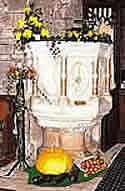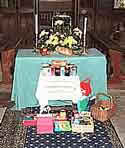| Faith & The church |
| Church & World |
| History |
| People & Features |
'Special Days'
.

As well as the Seasons and Major Festivals which help us worship God, the church celebrates several 'Special Days' throughout the year to remember, honour and support each other and our work in God's world. Celebration of the "Special Days" is usually optional, Christians chose which they want to remember, including: (Return to top)
| January | Plough Sunday |
| February | Education Sunday |
| March | Mothering Sunday |
| April | Rogation |
| May | Christian Aid Week |
| June | Fathers Day Reader Sunday |
| July | Sea Sunday |
| August | |
| September | Racial Justice Sunday Harvest Festival |
| October | Disability Sunday Animal Welfare Sunday Hospital Sunday |
| November | All Saints Day, All Souls Day, Remembrance Sunday |
| December | Nine Lessons & Carols Christingle Service |

Harvest produce displayed in Dymock Church
The full moon nearest the autumn equinox is called the 'Harvest Moon', so the ancient tradition was to celebrate the annual harvest on the Sunday nearest that moon, usually near the end of September but occasionally in early October. It should be no surprise, then, to learn that the word 'Harvest' comes from the Anglo-Saxon hærfest meaning 'Autumn'. (Return to top)
Several customs are associated with harvest. An early custom was to make a loaf of bread from the first wheat crop and offer it to God. This event was called Lammas, meaning 'Loaf Mass'. Another was to decorate the horse bringing in the last cart load of wheat with garlands of flowers and colourful ribbons. Also, it was not uncommon for the grateful farmer to put on a grand feast for the workers, often in the fields, when the harvest was completed. (Return to top)
Harvest Festival

Harvest gifts at the altar in Dymock church, later presented to the homeless in Gloucester city
Today it's still common to decorate the church with some of the best of the harvest - fruit, wheat, bread, etc and sing the traditional harvest hymns. In rural churches, locally produced food is usually still used for the decoration but in suburban and town churches it's not uncommon to use tins and packets of food bought from the supermarket. Either way, the food so presented in church is then packaged up after the Service and offered to local people such as the elderly or homeless. (Return to top)
It's also common to maintain the tradition of a feast after the harvest by having a meal for the congregation after the Harvest Service in church, known as the 'Harvest Supper' or 'Harvest Lunch' depending on the time of day it's held. (Return to top)
Whilst in the west we're not so reliant today on the vagaries of the weather, farmers are still affected by too little water, or too much, and sudden diseases such as Foot and Mouth or Potato Rot, so it's not unreasonable to give thanks to God for the harvest and to acknowledge his part in its successful outcome. (Return to top)
 St Mary's Church, Dymock
St Mary's Church, Dymock